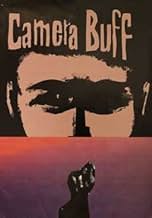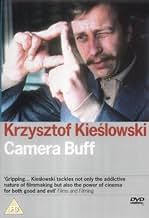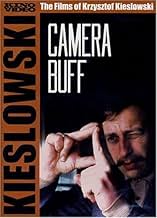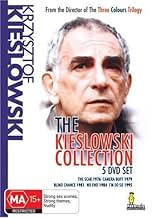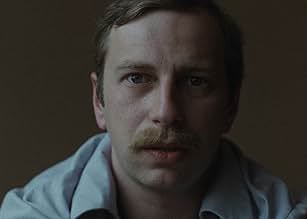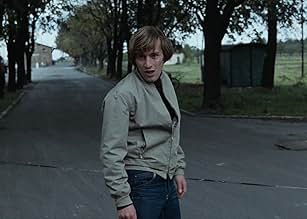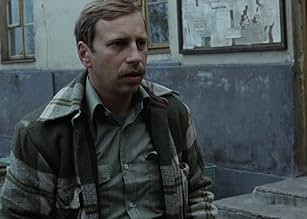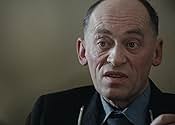An ordinary factory worker buys a camera on the occasion of the birth of his child. The authorities order him to make documentaries about the factory's success. But his endeavor to be truthf... Read allAn ordinary factory worker buys a camera on the occasion of the birth of his child. The authorities order him to make documentaries about the factory's success. But his endeavor to be truthful leads him to opposition against censorship.An ordinary factory worker buys a camera on the occasion of the birth of his child. The authorities order him to make documentaries about the factory's success. But his endeavor to be truthful leads him to opposition against censorship.
- Awards
- 6 wins total
Featured reviews
An early effort, 'Camera Buff' is not among Kieslowski's best work, but generally it is deserving of more love. Although Kieslowski's directing style is fairly well established, remarkable for so early on, it did become more refined later on as seen with his late 80s-early 90s work. There is a preference for the more intricate-sounding music scores of his later work, this score was the kind that worked well within the film but one doesn't have the desire to hear it on its own repeatedly, and the slightly more emotional resonant and intense work like the best of the 'Dekalog' series, 'The Double Life of Veronique' and 'Three Colors: Red' and 'Blue'.
Despite how that sounds, there's actually not much wrong at all with 'Camera Buff', just that it was done better later. This said, 'Camera Buff' is a great film, regardless of what stage it was made in Kieslowski's career.
'Camera Buff', as was always the case in Kieslowski's work, is very well made. The cinematography is minimalist, but visually striking and atmospheric as well as fascinatingly personal. As well as being beautifully shot with atmospheric use of colour to match the mood, it is gritty yet beautiful with many thoughtful and emotionally powerful images lingering long into the memory. Kieslowski's direction is quietly unobtrusive, intelligently paced and never too heavy.
It's a thought-provoking film in writing, as ever thematically rich and with complex characters, the shift from initial comedy to drama expertly done rather than abrupt and jarring. Kieslowski again proves himself as a master of narrative construction, and the whole film is thoroughly engaging and suitably challenging. The acting is as always from Kieslowski marvellously nuanced and natural.
To conclude, early Kieslowski that while not one of his best is deserving of more love. 9/10 Bethany Cox
"Camera Buff" explores censorship in Communist Poland and its repression of the individual's expression of his observations. Filip also confronts the consequences of a man who discovers new possibilities and finds his former world, which had been so fulfilling before he'd discovered filmmaking, rendered dull, old, and limited.
The story is interesting solely because of the Communist aspect. If it was just a story of man who becomes obsessed with making movies, it would be just another story about movies told in the form of a movie. But the Communist aspect? If one man in town has a camera, it suddenly becomes a tool for the entire city. It's interesting. This could be beautiful or ugly, depending on who happens to be in power.
Camera Buff is a wonderful story about a factory worker Filip (Jerzy Stuhr); a man who, in his thirties, begins to see life anew through the view finder of a small gauge movie camera. Originally purchased for "two months salary," which "pissed his wife off" to document his newborn daughter's first few steps, the 8 mm camera is quickly realized as something more useful than just a device for making home-movies. The narrative's tension is organized specifically around the reaction to the films of the institutional power structures and forces around Filip that essentially commissioned, financed, and instigated the films themselves along with Filip's newly discovered and unyielding passion for creating them as he sees fit.
If you view the Kino Video DVD release of this film, perhaps even more profoundly affecting than the feature as an augury of hope for the human race is the sixteen minute black and white documentary entitled Talking Heads in which Kielowski conducts helter-skleter a multitude of fifteen second interviews about "who you are" and "what you want" with Polish citizens, age zero to one-hundred, across all walks of life starting at the year 1979 with a little gurgling baby. In all, it's wonderful material and has me seeking out more Kieslowski.
Since I'm talking about movies and turning points in someone's life, Krzysztof Kieslowski's "Amator" is a brilliant and deep look into the life of a man who accidentally became a filmmaker. Here, Filip Mosz (Jerzy Stuhr) is a happy man that awaits the birth of his first child and he buys a camera to film the event. After that he realizes that he created a magical world through what he filmed, he notices that everything is different, beautiful behind the lens of a camera and starts to make simple documentaries, filming his friends, his neighborhood and everything he finds interesting to film.
But one day someone told to his boss that he has a camera and he needs the camera because the Comunist Party wants to film a celebration of a great event in the town. Since Filip is a State civil servant (working in a factory) he's almost forced to film the event (he's the only person in the whole city to have a 8mm camera). What is interesting here is that Filip enjoyed filming the celebration, doing a great job that caught the attention of his bosses and his friends and that led his film to be registered into a film festival for amateur filmmakers. Filip sudden success makes him moving forward in the making of all sorts of documentaries, one of this documentaries features an midget hard working colleague of Filip in the leading role, something that his bosses doesn't want to be filmed, after all Filip's films are sponsored by the Comunist Party and they don't want to get involved with supposed controversial subjects. Here starts Filip's problems, because now he has a conscience about the power of movies, the influence that his documentaries has in people's lives, in the government, and what it's images may cause to his family and his friends. Is it possible that people can respect and accept what you do even if what you do it's something that pushes away from all the people you love and care? Is Filip a responsible filmmaker or he's just pretending to be someone he's not to get attention? What is best: to be truthful to yourself and lie to others to have good relations or be truthful to everyone and be hated for it? Many questions to be answered by the viewers in this exciting and wonderful film.
Kieslowski knows exactly what's he doing here. This story hands perfectly well to him not only because he's a great artist that deal with many obstacles to make his movies. No, he started filming documentaries,pretty much in what Filip does, filming for the Comunist Party in Poland. In one of the documentaries he accidentally filmed an killing, then his bosses were told and started to control all of his films since then. His first films were censored during the 1970's and beginning of 1980's so in "Amator" we know what he's saying about the control of what filmmakers can do or not. If you are familiar with his first films you can notice that in almost all of it he criticizes the government in one way or another, his attacks are very sharp, very subtle in films like "Bez Konca". With the Trilogy of Colors, "A Short Film About Love" and the "Dekalog" you'll see that he's a more artistic creator. But as in all of his films he's got the partnership of the writer Krzysztof Piesiwicz, a great collaborator.
The acting here is great: Jerzy Sthur in the leading role is awesome. His quietness and strange manners put him in the same type of a Carlitos the Chaplin character, sometimes he's funny, other times he's very impulsive. Malgorzata Zabkowska plays Filip's conflicted wife, a woman that wants the attention of his husband that seems to care more about his movies than to health of his child. In the role of Witek, Filip's best friend and supporter, Tadeusz Bradecki gives a very good performance, showing the limits of what a man can do to a friend and what he won't do. When the movie becomes too slow and sometimes depressive Witek appears to show a little bit of humor.
Another great and reflective work from the fantastic director Kryzsztof Kieslowski, a must see film for those who admires his films, and for those who love movies as I do. 10/10
Did you know
- TriviaThe film's opening scene and Irka's nightmare about a hawk killing a chicken are reminiscent of Ken Loach's Kes (1969) -- a film about a boy who takes to training a wild kestrel in order to escape his troubled life. Later, Filip can be seen reading a filmmaking text and turning to a section about Ken Loach and Kes (1969). This reference is twofold. First, Filip is clearly inspired by filmmakers like Loach in making social realist films about working-class people. Second, Irka is tormented by images mirroring Kes (1969) which represent her husband's budding obsession with this type of filmmaking.
- Quotes
Piotrek Krawczyk: [looking at a roll of motion picture film] It's beautiful what you guys do. A person's no longer alive, yet she's still here. It's beautiful.
- ConnectionsFeatured in Fejezetek a film történetéböl: A lengyel film (1990)
- How long is Camera Buff?Powered by Alexa
Details
- Release date
- Country of origin
- Language
- Also known as
- Camera Buff
- Filming locations
- Rabka-Zdrój, Malopolskie, Poland(train station)
- Production company
- See more company credits at IMDbPro
Contribute to this page



